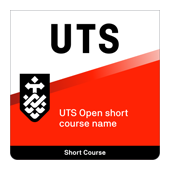Key benefits of this course
By the completion of this course, you should have an understanding of:
- The importance of building codes
- How to identify the format of housing provisions
- The language and clause structure
- Classifying buildings in accordance with the code
- Acceptable construction and performance provisions.
Digital badge and certificate

A digital badge and certificate will be awarded following the successful completion of any necessary tasks or assessments to demonstrate acquired learning of the short course or for meeting attendance and/or participation requirements.
Learn more about UTS Open digital badges.
Price
Full price: $698 (GST-free)*
*Price subject to change. Please check price at time of purchase.
Discounts are available for this course. For further details and to verify if you qualify, please check the Discounts section.
Discounts
Discounts are available for this course as follows:
- 10% discount for UTS staff, alumni and students
Discounts cannot be combined and only one discount can be applied per person per course session. Discounts can only be applied to the full price. Discounts cannot be applied to any offered special price.
How to enrol and obtain your UTS staff, alumni or student discount
Please contact the team at support@open.uts.edu.au with either your staff or student number.
If you are eligible for a UTS alumni or student discount, please ensure you have provided your UTS student number during checkout.
If you are an alumni and have forgotten your UTS student number, email support@utsopen.uts.edu.au with your full name, UTS degree and year of commencement.
In-house training solutions
The ABC of the Building Code of Australia course can also be customised and delivered in-house.
Delivery style
When not delivered face to face on-campus, this course will be delivered online via a live video link. Registered participants will be able to connect to the video link using Zoom and a reliable internet connection is required. Video connection details will be made available to each participant prior to the course via Canvas, the UTS Learning Management System (LMS). Course materials, presentations and/or readings will also be made available to participants within the Canvas LMS.
Enrolment conditions
Course purchase is subject to UTS Open Terms and Conditions.
Contact us
For any questions about enrolment or payment, please contact UTS Open Support at support@open.uts.edu.au
If you have a specific question on course content or requirements, please email ippg.learning@uts.edu.au



















